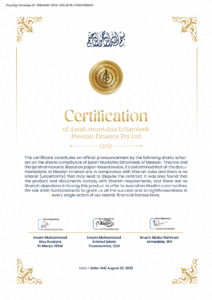SUPERANNUATION
Grow your own way
There are plenty of ways you can add to your super balance today to achieve the retirement lifestyle you want down the road.
Most employers currently contribute 9.5% of your salary into your super account via the compulsory Superannuation Guarantee (SG) payments. However, this might not be enough if you have particular retirement goals in mind. By boosting your balance with voluntary contributions, you may have more money to live the way you want, once you stop working.
There’s a number of ways to add to your super. Before you make any
extra contributions, you should consider your debt levels as well as
current and future financial commitments.

Employer Compulsory Super Guarantee
- Concessional (i.e. Pre-tax)
- Employers are required to pay you 9.5% of your income as super contributions
- Concessional Contribution Cap
Employer Additional Contribution
- Concessional (i.e. Pre-tax)
- This is anything that your employer pays you on top of the compulsory amount as part of your salary package
- Concessional Contribution Cap Applies
Employer Compulsory Super Guarantee
- Concessional (i.e. Pre-tax)
- Employers are required to pay you 9.5% of your income as super contributions
- Concessional Contribution Cap
Member Contribution
- Non-concessional (Post-Tax)
- Voluntary contribution to add to your super from your own pocket, and are paid via BPAY
- Non-Concessional Contribution Cap
Spouse Contribution
- Non-concessional (Post Tax)
- Voluntary contributions to add to your spouse’s account to boost their super. These contributions can be paid via BPAY
- Concessional Contribution Cap Applies
For more information
To find out more about Concessional and Non-Concessional contributions, the ATO or money smart Gov website.3
Its good to get financial advice
The key thing to note — once you add these contributions. you cannot withdraw a single cent. unless you meet a condition of release as specified by the ATO. The information stated above is general in nature and is not tailored to your personal circumstances. We recommend that you speak to your financial adviser to see whether making these contributions is right for YOU.
SUPERANNUATION
Non-Concessional Contributions
Non-concessional contributions are made into your super fund from after-tax income. These contributions are not taxed in your super fund.
There are caps on the non-concessional contributions you can make each financial year.
From 1 July 2017, the annual non-concessional (after tax) contribution cap was reduced from $180,000 to $100,000 per year. The cap will be indexed in line with the concessional contributions caps.
If you exceed your non-concessional contributions cap in a financial year, you must lodge a tax return for that year, and you may have to pay extra tax.

Non-Concessional Contributions Caps
| Financial Year | Non-Concessional Cap | Tax on amounts over Cap |
|---|---|---|
| 2020 – 2021 | $100,000 | 47% |
| 2019 – 2020 | $100,000 | 47% |
| 2018 – 2019 | $100,000 | 47% |
| 2017 – 2018 | $100,000 | 47% |
| 2016 – 2017 | $180,000 | 47% (plus 2% budget repair levy) |
| 2015 – 2016 | $180,000 | 47% (plus 2% budget repair levy) |
| 2014 – 2015 | $180,000 | 47% (plus 2% budget repair levy) |
| 2013 – 2014 | $150,000 | 47% |
Types of Non-Concessional Contributions include:
- Contributions you make, or your employer makes on your behalf, from your after-tax income
- Excess concessional (before-tax) contributions you have not elected to release from your super fund
- Contributions your spouse makes to your super fund (unless your spouse makes the contributions because they’re your employer)
- Contributions over your capital gains tax (CGT) cap amount
- Personal contributions not claimed as an income tax deduction
- Retirement benefits you withdraw from your super fund and ‘re-contribute’ to super
SUPERANNUATION
What is salary sacrificing
and how does it work?
When you “sacrifice” some of your salary, you make an agreement with your employer to pay it straight into your super account, instead of your bank account. This is an amount on top of your employer’s compulsory Superannuation Guarantee payment (9.5% of your salary).

01You pay less tax
Salary in your super account gets taxed at 15% (if you earn less than $250,000) or 30% (if you earn more than $250,000). However, any salary you take home gets taxed at your usual income rate, which can be as high as 47%.
02You reduce your taxable income
The more salary you put into your super, the smaller your taxable income may be — and that could mean even more savings at tax time.
Setting up salary sacrificing to save more for your retirement might seem like a no-brainer. In addition to considering your debt levels before adding to your super, weigh up the following:
01It’s not as effective for low-income earners
If you earn less than $37,000, you’ll only save a small amount on tax – it’s probably not worth having less in your pocket on payday for a small tax gain.
02It may impact your current benefits
When you salary sacrifice, you change your salary. This means that benefits like holiday loading and overtime might be affected if they’re tied to your salary. To protect your benefits while salary sacrificing, you’ll need to reach an agreement with your employer.
03You can’t claim deductions/tax offsets on sacrificed amounts
You can’t claim deductions/tax offsets on sacrificed amounts
04There’s a $25,000 limit on concessional contributions (including employer contributions).
Any amounts over the $25,000 p.a. limit will be taxed at your marginal tax rate, plus an excess concessional contributions charge. From 1 July 2019 you may be able to carry forward any unused portion of the concessional contributions cap from previous financial years. Eligibility criteria applies, see the Super contributions limit fact sheet for full details.
How to get started
If you’d like to start adding more to your super
through salary sacrificing. then consult with one
of our financial adviser
What Our Clients Say
“We would like to express our thanks for the work you have done for us over the past years. The expertise and attention to detail with which you have handled our financial affairs could not be faulted. Particularly reassuring to us is our feeling of certainty in the absolute integrity of your dealings with us. Your continual advice on financial planning issues has saved us significant amounts of money. May you prosper, along with your clients.”
Dr Mutasim Sadiq
“Meezan finance provided us an outstanding service throughout the whole application process. The staffs were very responsive to our needs, answered our telephone calls and emails promptly, followed up with sellers, solicitors and arranged property settlement for us. We are happy that through Meezan Finance we have achieved the best Islamic loan for our family’s needs. We have no hesitation in recommending Meezan wealth to anyone.”
Usman Saleem
Senior Technical Manager (IBM)
“Passion, knowledge and a genuine interest in achieving the best for clients is what makes a truly professional Financial Adviser. Rokibul always had this and more. His dedication to clients, business excellence and education sets him apart and I would highly recommend him to anyone wanting to achieve better financial outcomes.”
Sameer Syed
IT Developer (Inenco Group)
“I am absolutely delighted with your service. It is really refreshing to work with a financial adviser who is truly interested in their client’s needs, circumstances and preferences. What really impressed me was the way you took the time to get a feeling for where I was at, your depth of knowledge, lateral thinking and your common-sense approach. Your professional, ethical and caring demeanour elicits my trust and respect and I gladly recommend your services whenever possible.”
Amer Islam
IT Consultant

Get in Touch
Our qualified team are ready to assist you with your questions.
Talk to Us
Bankstown:
Suite-104, 8 French Avenue, Bankstown, NSW 2200
Email Us


